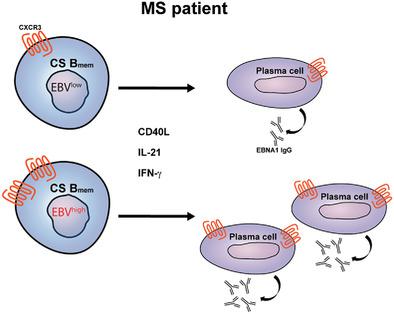当前位置:
X-MOL 学术
›
Eur. J. Immunol.
›
论文详情
Our official English website, www.x-mol.net, welcomes your
feedback! (Note: you will need to create a separate account there.)
The association of Epstein‐Barr virus infection with CXCR3+ B‐cell development in multiple sclerosis: impact of immunotherapies
European Journal of Immunology ( IF 4.5 ) Pub Date : 2020-11-05 , DOI: 10.1002/eji.202048739 Jamie van Langelaar 1 , Annet F Wierenga-Wolf 1 , Johnny P A Samijn 2 , Caroline J M Luijks 1 , Theodora A Siepman 3 , Pieter A van Doorn 3 , Andrew Bell 4 , Menno C van Zelm 5 , Joost Smolders 1, 3, 6 , Marvin M van Luijn 1
European Journal of Immunology ( IF 4.5 ) Pub Date : 2020-11-05 , DOI: 10.1002/eji.202048739 Jamie van Langelaar 1 , Annet F Wierenga-Wolf 1 , Johnny P A Samijn 2 , Caroline J M Luijks 1 , Theodora A Siepman 3 , Pieter A van Doorn 3 , Andrew Bell 4 , Menno C van Zelm 5 , Joost Smolders 1, 3, 6 , Marvin M van Luijn 1
Affiliation

|
Epstein–Barr virus (EBV) infection of B cells is associated with increased multiple sclerosis (MS) susceptibility. Recently, we found that CXCR3‐expressing B cells preferentially infiltrate the CNS of MS patients. In chronic virus‐infected mice, these types of B cells are sustained and show increased antiviral responsiveness. How EBV persistence in B cells influences their development remains unclear. First, we analyzed ex vivo B‐cell subsets from MS patients who received autologous bone marrow transplantation (n = 9), which is often accompanied by EBV reactivation. The frequencies of nonclass‐switched and class‐switched memory B cells were reduced at 3–7 months, while only class‐switched B cells returned back to baseline at 24–36 months posttransplantation. At these time points, EBV DNA load positively correlated to the frequency of CXCR3+, and not CXCR4+ or CXCR5+, class‐switched B cells. Second, for CXCR3+ memory B cells trapped within the blood of MS patients treated with natalizumab (anti‐VLA‐4 antibody n = 15), latent EBV infection corresponded to enhanced in vitro formation of anti‐EBNA1 IgG‐secreting plasma cells under GC‐like conditions. These findings imply that EBV persistence in B cells potentiates brain‐homing and antibody‐producing CXCR3+ subsets in MS.
中文翻译:

爱泼斯坦-巴尔病毒感染与多发性硬化症中 CXCR3+ B 细胞发育的关联:免疫疗法的影响
B 细胞的爱泼斯坦-巴尔病毒 (EBV) 感染与多发性硬化 (MS) 易感性增加有关。最近,我们发现表达 CXCR3 的 B 细胞优先浸润 MS 患者的 CNS。在慢性病毒感染的小鼠中,这些类型的 B 细胞持续存在并表现出增强的抗病毒反应能力。B 细胞中 EBV 的持久性如何影响其发育尚不清楚。首先,我们分析了接受自体骨髓移植的 MS 患者的离体 B 细胞亚群(n= 9),这通常伴随着 EBV 重新激活。非类别转换和类别转换记忆 B 细胞的频率在 3-7 个月时降低,而只有类别转换 B 细胞在移植后 24-36 个月恢复到基线水平。在这些时间点,EBV DNA 负载与 CXCR3 +的频率正相关,而不是 CXCR4 +或 CXCR5 +,类别转换 B 细胞。其次,对于困在用那他珠单抗(抗 VLA-4 抗体n)治疗的 MS 患者血液中的CXCR3 +记忆 B 细胞= 15),潜伏的 EBV 感染对应于 GC 样条件下抗 EBNA1 IgG 分泌浆细胞的体外形成增强。这些发现意味着 B 细胞中 EBV 的持续存在增强了 MS 中的大脑归巢和抗体产生 CXCR3 +子集。
更新日期:2020-11-05
中文翻译:

爱泼斯坦-巴尔病毒感染与多发性硬化症中 CXCR3+ B 细胞发育的关联:免疫疗法的影响
B 细胞的爱泼斯坦-巴尔病毒 (EBV) 感染与多发性硬化 (MS) 易感性增加有关。最近,我们发现表达 CXCR3 的 B 细胞优先浸润 MS 患者的 CNS。在慢性病毒感染的小鼠中,这些类型的 B 细胞持续存在并表现出增强的抗病毒反应能力。B 细胞中 EBV 的持久性如何影响其发育尚不清楚。首先,我们分析了接受自体骨髓移植的 MS 患者的离体 B 细胞亚群(n= 9),这通常伴随着 EBV 重新激活。非类别转换和类别转换记忆 B 细胞的频率在 3-7 个月时降低,而只有类别转换 B 细胞在移植后 24-36 个月恢复到基线水平。在这些时间点,EBV DNA 负载与 CXCR3 +的频率正相关,而不是 CXCR4 +或 CXCR5 +,类别转换 B 细胞。其次,对于困在用那他珠单抗(抗 VLA-4 抗体n)治疗的 MS 患者血液中的CXCR3 +记忆 B 细胞= 15),潜伏的 EBV 感染对应于 GC 样条件下抗 EBNA1 IgG 分泌浆细胞的体外形成增强。这些发现意味着 B 细胞中 EBV 的持续存在增强了 MS 中的大脑归巢和抗体产生 CXCR3 +子集。











































 京公网安备 11010802027423号
京公网安备 11010802027423号